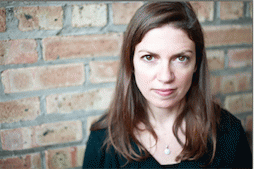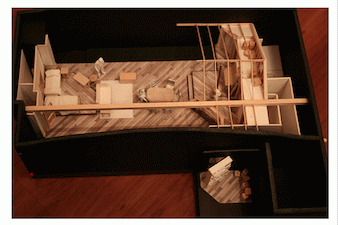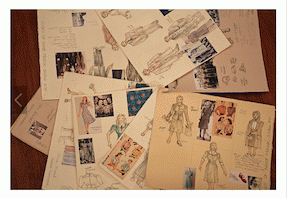| Back OpEd News | |||||||
|
Original Content at https://www.opednews.com/articles/The-Diary-of-Anne-Frank--by-Joan-Brunwasser-Anne-Frank_Chicago_Design_Family-150416-190.html (Note: You can view every article as one long page if you sign up as an Advocate Member, or higher). |
|||||||
April 16, 2015
"The Diary of Anne Frank" - What Can There Possibly Be Left to Say?
By Joan Brunwasser
I believe we tell stories in an attempt to understand. With Diary, it still makes no sense to us-- the ridiculousness of the cruelty, the fact that they were on the last train to leave Westerboerk. Plus, performing in the space we are in where only 60 people experience the story at the time. They are literally inside the annex! And can see one another watching the play which adds another layer of empathy.
::::::::
New production at Writers Theatre. directed by Kimberly Senior
My guest today is Kimberly Senior, director of Writers Theatre's production of The Diary of Anne Frank.
JB: Welcome to OpEdNews, Kimberly. This is probably the most famous diary of our time, if not of all time. The book has been translated into 67 languages, and the play has been performed thousands of times across the globe over the last fifty years. Isn't that incredibly daunting? What fresh and new can you bring to the mix?
KS: Strangely, I haven't found it daunting. I mean, it seems so important to keep telling this story. I believe we tell stories in an attempt to understand; we hash and rehash to try to come up with an explanation. With Diary, it still makes no sense to us-- the ridiculousness of the cruelty, the fact that they were on the last train to leave Westerboerk. Plus, performing in the space we are in where only 60 people experience the story at the time. They are literally inside the annex! And can see one another watching the play which adds another layer of empathy.
JB: You've just pointed out a few of the perks of such an intimate venue. Let's talk about the set design a bit more. A lot of thought went into that aspect of the production. You could say that the set itself is a character in the play. How did you come up with this specific design and what were you aiming for?
KS: In collaborating with the set designer, Jack Magaw (who also happens to be my husband), we really wanted to take advantage of the close quarters: something that a larger, proscenium house can't achieve as well is the sense of claustrophobia. We began by looking at extant photos and ground plans of the actual annex. Then, we did the best we could to recreate that. The rules that are explicitly outlined - both in the play and in the diary itself - plus the tiny footprint of the space really make for another kind of psychological torture that the Annex residents endured.
JB: As a member of the audience, I can attest to the claustrophobic atmosphere. With all of us crowded in no more than a few feet from the action, there was literally no place to hide - from the emotion, from the story, from anything. The Diary has sold more than 30 million copies over the years, many of them to high school students. But the version that many of us read before the mid-'90s was quite different from the "real" version of the Diary. Tell us more about that, please.
KS: I'm not a total expert on that subject, I hate to say. I really had to commit to making the play that was in front of me, so although I've read the Diary and other source material, I worked primarily from Kesselman's script. I do know that an earlier version was much more sanitized - not really showing some less flattering qualities of Anne, as well as removing some of the more "Jewish" aspects of the play in order to make it more universal. I tend to believe that the universal is found when we get really specific. Some of my favorite stories are of times and places I have never traveled and, through storytelling, I get to see myself in those stories and have greater empathy.
JB: Unlike most books and plays, we all know the outcome before we sit down to read or watch this play. Good and bad timing figure large in this drama as well. The Franks are ratted out after the Allied Normandy invasion but just in time to be on the very last transport from Holland to the concentration camps. Anne dies of typhus shortly before Liberation. Even the diary itself - Anne received it as a birthday gift less than a month before they go into hiding. Time in the Annex is weirdly compressed; it slows to a crawl and yet they are cocooned there - crowded, crabby, worried, but safe - at least until the end. How do you handle the quixotic element of time in your production?
KS: That is a very interesting question. Time is not really marked by clocks or calendars in their world. They have the chiming of the Westertoren until 3/25/1943 and that gave them a sense of time and the outside world. They had the sounds of the office from below the Annex which marked dangerous moments in which they needed to be silent. Life starts to mark time - Anne's menstruation, falling in love with Peter, Miep's visits, occasional holidays. The tension of wanting time to pass - each day could mean the end of the war - and wanting time to stand still - moments of safety and comfort - is something that really drives the tempo of the production.
JB: The playbill for this production was like nothing I'd seen before. Traditionally, playbills contain the standard bios and an article about the specific production. That's about it. This playbill is in a category by itself: it's chock-full of fascinating information. I'd read the Diary as a child; I considered myself pretty familiar with the story and yet, within the playbill pages, I learned a lot about the play, this production and the story behind the Diary. Kudos. How was the decision made to expand this playbill and its basic function?
KS: You'd really have to talk more to the amazing staff at Writers' Theatre about that! I do know that the program for every show at the theater is crafted to perfection - providing both dramaturgical resource as well as personal insight into the work at hand.
That's impressive! The Diary of Anne Frank is a heavy piece. I've wondered how you rejoin the world after a performance for a few hours or a day until it's time to immerse yourself again. How do you and the actors maintain your sanity and equilibrium with all that shifting back and forth? I understand you're also a mom. How do you do "normal" with your kids amidst all the emotions swirled up by this play?
JB: Great question. And it's tough. The cast and I have joked that we need a therapy puppy or an infant or a basket of kittens backstage. And while we were rehearsing, we all found ourselves constantly eating - just to comfort ourselves, I think! For artists, and hopefully audiences, we get so immersed - we have to live in the work in order to make it. I find that it's best to let your two worlds talk to each other. My kids (Noah, 8; Delaney, 6) and I have had lots of discussions about the Holocaust, they've seen the play and understand what I'm doing. When I don't have to shut that part down, I am able to illuminate other things about the work when it is integrated in my life. Plus, I am obsessive about doing super hot yoga- I do it daily and it is so wonderful for my mental space. I'm constantly listening to music, too, and it's a wonderful activity to keep my brain and heart occupied in another way.
KS: Speaking of kids, what's it like working with young actors? Even though I read the bios before the performance, I had to shake myself afterward to remind myself that Anne was played with great sensitivity by Sophie Thatcher, a middle-schooler. A middle-schooler! I just couldn't wrap my mind around that. Your thoughts?
JB: Sophie is remarkable. We joke that she is more mature and professional than we are. It's great because she also keeps a journal and has ready access to so many of the things that Anne is experiencing. She was a pleasure in the room - and has a vast array of personal and professional credits to draw from!
JB: I agree, she is remarkable. I understand that beyond your extensive directing creds, you've been an actor yourself and seem to have performing in your genes. What can you tell us about that?
KS: I like to think of myself as an "actor's director" - what I'm most interested in is the psychology of our work, what happens in relationships on stage so that is always where I begin when working on a play. In looking at Anne Frank, we are talking about this group of people occupying the space, a mother/daughter, the public display of the Van Daan's marriage, etc. I think my acting background definitely contributes to an ease with the language of acting. Most of my work was musical theater or Shakespeare though so that gives you a sense of my, um, exuberance - shall we say?
JB: You also get your literary ya-yas through your award-winning teaching, yet another hat you wear - (it's amazing you don't have a big head with all those hats!). More, please, about the teaching.
KS: Teaching is so vital to me! I hadn't done the past few semesters and I am back in the classroom now - it is so important. First of all, my students are an endless source of inspiration and keep me current with pop culture! Furthermore, you get a shorthand going when you do something often - especially since I work with the same collaborators so frequently - so having to articulate myself clearly with my students is such a fantastic exercise. It helps me to deepen and expand my technique and philosophy. Our work is ever-changing and growing and the classroom is a great space for that. Plus, I love being around the next generation of theater-makers and viewers. We are in very good hands, I assure you!
JB: That's a relief. I'm intrigued, Kimberly. Can you be a bit more specific? What exactly do you teach? And where?
KS: This semester, I am teaching Dramaturgy at Columbia College Chicago and Directing I to the first year MFA directors at DePaul. In both classes, I think there is an emphasis on being a 360 degree artist - how does the world around us influence our work? And then on the technical side, a heavy emphasis on text analysis and structure in the plays. This macro/micro combination leads to some amazing discussions about the role of the artist in society.
JB: I bet you're a humdinger of a teacher! What would you like to talk about that we haven't yet?
KS: World peace? Raising kids in our times? Wow, so much more. Mostly, I feel fortunate to be in this moment, to live in these vibrant and reverberating times, and to be able to tell stories that hopefully have resonant meanings shedding light on our past and present and inspiring us towards the future. It's been a pleasure talking to you!
JB: I enjoyed myself immensely, Kimberly. Let's do this again and we'll talk about everything we missed first time around! Readers, if you're in the Chicago area, I definitely recommend you catch The Diary of Anne Frank at the Writers Theatre. You'll be glad you did.
***
Diary of Anne Frank, at Writers Theatre, running through August 2, 2015
Senior's website
Anne Frank's Betrayer Discovered? 4.9.2015: new book just published in Belgium and Holland with previously unpublicized documentation about who turned the Frank family in to the Nazis.
Netherlands Institute for War Documentation, whose mission it has been to collect and make available documents about the Nazi occupation of the Netherlands and the German camps there, put out "The Definitive Edition" of the diary in 1995 to put to rest ongoing allegations that the diary was not actually written by Anne Frank.
Authors Website: http://www.opednews.com/author/author79.html
Authors Bio:
Joan Brunwasser is a co-founder of Citizens for Election Reform (CER) which since 2005 existed for the sole purpose of raising the public awareness of the critical need for election reform. Our goal: to restore fair, accurate, transparent, secure elections where votes are cast in private and counted in public. Because the problems with electronic (computerized) voting systems include a lack of transparency and the ability to accurately check and authenticate the vote cast, these systems can alter election results and therefore are simply antithetical to democratic principles and functioning.
Since the pivotal 2004 Presidential election, Joan has come to see the connection between a broken election system, a dysfunctional, corporate media and a total lack of campaign finance reform. This has led her to enlarge the parameters of her writing to include interviews with whistle-blowers and articulate others who give a view quite different from that presented by the mainstream media. She also turns the spotlight on activists and ordinary folks who are striving to make a difference, to clean up and improve their corner of the world. By focusing on these intrepid individuals, she gives hope and inspiration to those who might otherwise be turned off and alienated. She also interviews people in the arts in all their variations - authors, journalists, filmmakers, actors, playwrights, and artists. Why? The bottom line: without art and inspiration, we lose one of the best parts of ourselves. And we're all in this together. If Joan can keep even one of her fellow citizens going another day, she considers her job well done.
When Joan hit one million page views, OEN Managing Editor, Meryl Ann Butler interviewed her, turning interviewer briefly into interviewee. Read the interview here.
While the news is often quite depressing, Joan nevertheless strives to maintain her mantra: "Grab life now in an exuberant embrace!"
Joan has been Election Integrity Editor for OpEdNews since December, 2005. Her articles also appear at Huffington Post, RepublicMedia.TV and Scoop.co.nz.




![Anne and sister Margot [Lila Morse] in a lighter moment Anne and sister Margot [Lila Morse] in a lighter moment](https://www.opednews.com/populum/visuals/2015/04/2015-04-79-308-ImagesAttr-populum_uploadnic_michael-brosilow-png_79_20150416-450.png)